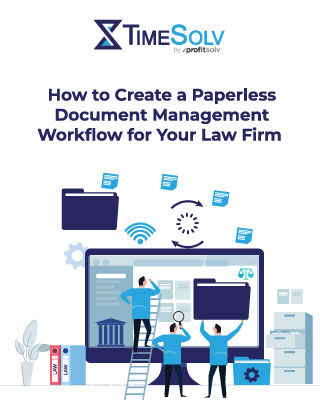Success is a little like trying to fold a fitted sheet—everyone says it’s possible, but it can feel like a mystery when it comes to actually achieving it.
For most, the recipe for success is a mix of ambition, drive, and the ability to turn coffee into productivity. But if you’re trying to build a successful law firm, you’ll need a bit more than these three ingredients.
You need a strategy.
In fact, the most successful law firms drive their business forward by implementing proven strategies that keep them on the path to success and sustainable growth. But your firm doesn’t have to start from scratch; you can learn from their best practices to achieve the success you’re after.
What’s in the sauce? Six secrets of successful law firms
Each law firm is different, but these best practices will work across virtually every firm size and practice area. (Nonetheless, implement the most relevant tips for you and leave the rest!)
1. Define success and set SMART goals
Successful law firms aren’t run by those who simply ride a wave of ambition—they’re managed by those who navigate the industry with a clear vision for their future. The focal point of this vision is defining what success means for you.
Instead of pursuing vague aspirations, the best law firms opt for a more systematic approach: SMART goals. SMART goals are:
Specific
Success grows from specificity. Instead of setting ambiguous goals, dig into your particular needs and develop actionable items to get you where you want to go.
Ask yourself:
- What do I want my firm to achieve?
- What steps must be taken to achieve this goal?
- Who is responsible for the steps involved?
When you do this, vague goals become specific objectives.
Instead of: Improve client relations
Try a SMART goal like: Conduct quarterly client satisfaction surveys and implement feedback options to enhance client communications and relations.
Measurable
To gauge progress and measure success, the best law firms attach measurable metrics to their objectives.
Instead of: Increase the law firm’s revenue
Try a SMART goal like: Achieve a 15% increase in revenue over the next fiscal year through strategic client expansion and improved billing practices.
Achievable
Ambition is an important ingredient in success, but successful law firms blend it with pragmatism.
Your goals need to be challenging but also realistic. If you’re overly ambitious, you’re less likely to meet your goals.
Instead of: Establish a dominant market position over the next six months.
Try a SMART goal like: Increase our market share by 10% within the next year with a robust marketing strategy.
Relevant
Your goals must align with your firm’s overarching mission and values. An objective like launching a new service to diversify your revenue streams is relevant if you’re striving for diversification, but not if stability is your immediate priority.
Time-bound
Time is crucial for achieving your goals, and great law firms understand that setting deadlines for their goals is paramount to getting things done.
Instead of: Improve internal processes
Try a SMART goal like: Implement a new case management system to enhance efficiency and reduce turnaround time by 20% within the next six months.
A systematic approach to goal-setting ensures that all your efforts directly contribute to your firm’s growth, providing a roadmap for decision-making and allowing you to move forward with purpose and clarity.
How to Create a Paperless Document Management Workflow for Your Law Firm
To provide your clients with the best value possible, consider setting up paperless
document management workflows.
Don’t know where to start? Consider this your step-by-step map to creating a more efficient, eco-friendly law firm.
Download our free guide to create a paperless document management workflow for your law firm today!
2. Use data to make decisions
Time is an invaluable resource, especially in the legal industry. Successful law firms recognize this and create a culture of data-driven decision-making to establish efficient processes, deliver great client service, and create sustainable growth.
But where does that data come from? Data can be gathered from numerous places, but one especially useful source is time- and expense-tracking. Time- and expense-tracking data helps your firm analyze billing rates, resource allocation, and overall operational efficiency.
(An important note, though: for this data to be helpful, it needs to be accurate. Make sure your firm has solid time- and expense-tracking tools and processes in place!)
3. Prioritize client service and experience
While data is vital, it’s just as essential to focus on the human side of things.
Prioritizing client service and experience is imperative for practices to grow—but just as importantly, build the kind of reputation that supports growth.
Spending the time to foster client relationships and deliver exceptional service is the bedrock of this reputation. Satisfied clients lead to repeat business, plus a valuable networking resource that can lead to new client referrals and an expanded market share in your niches.
4. Embrace technology (in a strategic way)
From time tracking and invoicing to payment solutions and dashboards, the right practice management software streamlines your processes and gives your firm an edge over the competition. However, that list alone gives you an indication of just how many tools there are for law firms to choose from.
Simply put, it’s not practical for law firms to juggle dozens (or even half a dozen) software solutions. If the goal is to streamline your practice, start by streamlining your tech stack to reduce bloat, costs, and information silos.
When looking for a comprehensive tech solution for your firm, make sure you choose a service that offers all the tools you need on a secure, cloud-based platform that’s easy for everyone at your firm to use.
5. Identify opportunities to optimize your processes
Operational excellence isn’t a destination—it’s a journey. Successful law firms are tireless in their pursuit of process optimization.
A prime example of this process is implementing technology to automate time-consuming processes so that your team is free to focus on more high-value work. This not only boosts productivity but minimizes the risk of human error or delays in delivery.
Examples of high-ROI automations for law firms include:
- Document assembly
- Invoice templates
- Batch billing
- Automated UTBMS/LEDES codes
- Automated payments (and payment reminders)
6. Strategically outsource your processes
While optimizing your internal processes is critical, the most successful law firms also recognize the value of strategic outsourcing. Outsourcing non-core functions to external experts allows your firm to focus on its core competencies and keep things moving in the right direction.
Some processes that can be outsourced for your gain are IT management, administrative tasks, and web design.
Outsourcing can cut costs and allow you to put your resources where they’ll make the most significant impact, which gives you the ability to provide top-notch legal services to your clients and keep growing your firm.
Looking for that secret ingredient to achieve success?
If you’re looking to grow and scale your firm, you need a legal-specific tool that’s tailored to the unique needs of your firm so that you’re always set up for success.
Whether you’re looking to automate administrative processes to free up more time or need multiple solutions for client communication, invoicing, and billing, TimeSolv has solutions for any challenges you might face on the road to becoming a master of your craft.
Ready to see what TimeSolv can do for your firm? Schedule your free demo today!
More useful posts:
How to Create a Paperless Document Management Workflow for Your Law Firm
To provide your clients with the best value possible, consider setting up paperless
document management workflows.
Don’t know where to start? Consider this your step-by-step map to creating a more efficient, eco-friendly law firm.
Download our free guide to create a paperless document management workflow for your law firm today!
















